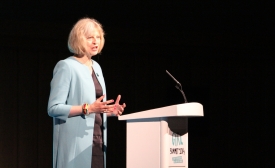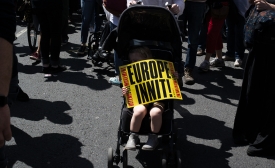Theresa May
With British Prime Minister May set to arrive in Ankara today to meet her Turkish counterpart, Binali Yıldırım, experts highlighted the importance of her visit, especially right after her trip to the U.S. Commenting on the visit, diplomatic sources in Ankara stated, "Prime Minister May's visit will reflect the fact that Turkey is an indispensable partner and a close ally for the U.K. on many issues of global importance, including trade, security and defense."
So, ‘global Britain’ eh? This, we are told, will be the leitmotif for Theresa May’s Brexit speech tomorrow and, indeed, for her approach to international affairs more generally. And who could disagree with any of that? The argument will, of course, be couched in economic terms. The spirit of Britannia will be unleashed to sail the world’s oceans. Britain is back, you know.
May’s focus was on the need to ensure that the benefits of "liberalism and globalisation" are more evenly distributed. For her, the EU referendum and the US presidential election should be read as wake-up call. Important as this analysis may be for electoral politics, it does not set out a clear road map for the UK’s future foreign policy.
There is increasing evidence that we may end up with a hard Brexit. Britain will activate Article 50: the UK will retain control of its own borders, but without access to the single market or European passporting for its financial services industry. While many would portray this as a failure of diplomacy, it may be a smart negotiating tactic.

What can Theresa May learn from Mao Zedong?
On his last day in Downing Street, David Cameron said one of his proudest achievements was to honour the commitment to spend 0.7% of gross national income on international aid. It was partly an attempt to stake out his legacy and partly a pitch to his successor, Theresa May, to stick to, what remains, a Conservative manifesto pledge.

An analysis of the Brexit vote, Part 2.







